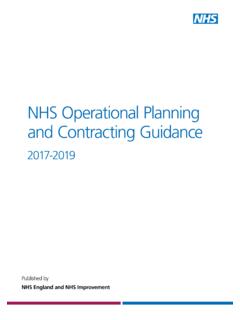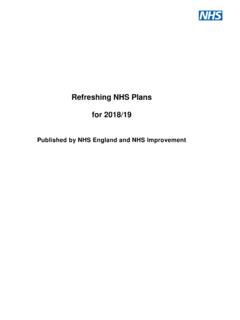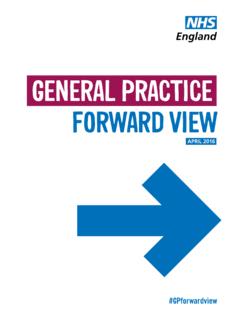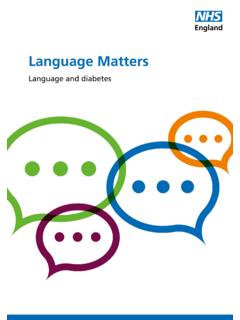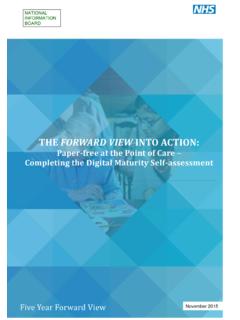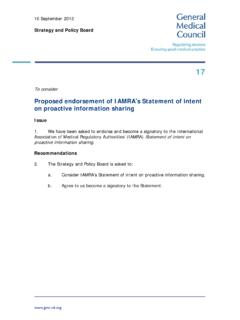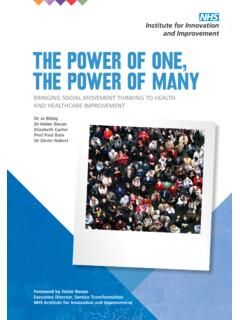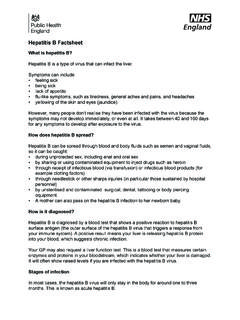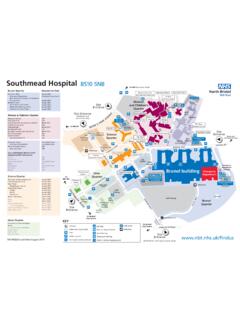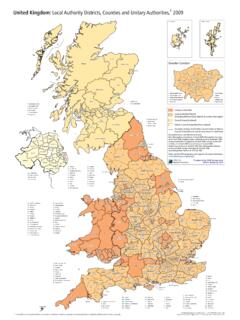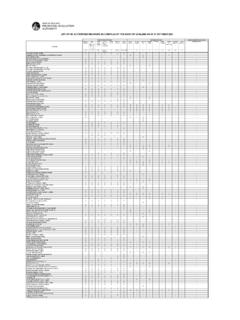Transcription of The Spotty Book Notes on infectious diseases in Schools ...
1 The Spotty Book Notes on infectious diseases in Schools and Nurseries Public Health England South West Health Protection Team The Spotty Book: Notes on infectious diseases in Schools Sept18 2 About Public Health England Public Health England exists to protect and improve the nation s health and wellbeing, and reduce health inequalities. We do this through world-class science, knowledge and intelligence, advocacy, partnerships and the delivery of specialist public health services. We are an executive agency of the Department of Health, and are a distinct delivery organisation with operational autonomy to advise and support government, local authorities and the NHS in a professionally independent manner. Public Health England Wellington House 133-155 Waterloo Road London SE1 8UG Tel: 020 7654 8000 Twitter: @PHE_uk Facebook: Prepared by: The South West Health Protection Team For queries relating to this document, please contact: 0300 303 8162 opt 1 Crown copyright 2017 You may re-use this information (excluding logos) free of charge in any format or medium, under the terms of the Open Government Licence To view this licence, visit OGL or email Where we have identified any third party copyright information you will need to obtain permission from the copyright holders concerned.
2 Published October 2017 Updated Sept 2018 PHE publications PHE supports the UN Sustainable Development Goals The Spotty Book: Notes on infectious diseases in Schools 3 Revisions & Updates Page number Revision/Update Who by Date Whole document review Helen Trudgeon PHE SW HPT Aug 17 P11 Routine Childhood Immunisation Schedule Fiona Neely PHE SW HPT Aug 18 P15-24 Update of -cleaning, disinfection and suitable facilities guidance, -Dealing with spills of blood and body fluids -Bottle feed prep to amalgamate with and include items developed by Dorset Health Protection Network IPC in Schools Project 2015-16 Fiona Neely PHE SW HPT Aug 18 P29 Clarification of exclusion period for Chicken pox and consistency with PHE and NICE guidance Fiona Neely PHE SW HPT Aug 18 P93 Update on legislation used for Guidelines on Food Hygiene for Childminders Caroline Fair EHO Poole Fiona Neely PHE SW HPT Aug 18 P101 New IPC Audit Tool added Bournemouth, Poole & Dorset Councils.
3 Public Health Dorset & PHE SW HPT Sept 18 P10 & P49 P11 P31 P49 & 50 P95 P99 P100 App Whole document review - Update on flu vaccination and other changes immunisation schedule - Immunisation schedule table renewed/updated from web - Addition of Cold Sores/Herpes simplex chapter - Exclusion period after flu clarified with the addition of (usually 5-7 days) - Risk assessment advice on cleaning after noro revised last sentence on page - Exclusion table renewed from web in case of updates - Note after exclusion table re. gastro infection clearance - Other minor typos and clarifications - School nursing updates for BANES, Devon, Somerset, , Dorset, Wilts Sharon Hilton/ Fiona Neely Sept 19 The Spotty Book: Notes on infectious diseases in Schools 4 Contents About Public Health England 2 Executive summary 7 Introduction 8 Childhood immunisation 10 Hand hygiene 12 Cleaning, disinfection & suitable facilities 15 Deep Terminal Cleaning After An Outbreak 20 Dealing with spills of body fluids 21 Management of cuts/abrasions and spills of blood 23 Guidelines of Farm and Countryside visits 25 Deciding to get a resident school pet Animals in Schools 27 Common Childhood diseases 28 Chickenpox and Shingles 28 Cold Sores / Herpes simplex 31 Conjunctivitis 33 Glandular fever 35 Hand.
4 Foot and Mouth Disease 37 Head lice 39 Hepatitis or Jaundice 41 Impetigo 44 infectious Diarrhoea and Vomiting 46 Influenza 49 Measles 54 Meningitis and Septicaemia 57 Molluscum Contagiosum 63 Mumps 65 Parvovirus (Slapped Cheek / Fifth Disease) 67 Panton-Valentine Leukocidin (PVL) 69 Respiratory Syncytial Virus (RSV) 71 Ringworm 74 Rotavirus 77 Rubella 78 The Spotty Book: Notes on infectious diseases in Schools 5 Scabies 80 Scarlet fever 81 Threadworms 84 Tuberculosis (TB) 86 Warts and Verrucas 89 Whooping Cough (Pertussis) 91 Pregnant staff/students 93 Guidelines on food hygiene for childminders 95 Frequently asked questions about outbreaks in Schools and nurseries 97 Appendices 1 Suggested letter to parents/guardians diarrhoea and vomiting 98 2 Suggested letter to parents Flu-like illness 99 3 List of notifiable diseases 100 4 Exclusion table 101 5 IPC Audit Tool 103 6 School nursing service contact details 123 The Spotty Book.
5 Notes on infectious diseases in Schools 6 Health Protection Team CONTACT DETAILS Public Health England South West Health Protection Teams Telephone contact details For Devon, Cornwall, Dorset, Somerset, Avon, Gloucestershire and wiltshire ; Public Health England South West Health Protection Team Tel 0300 303 8162 (option 1; option 1) Postal addresses For Avon, Gloucestershire and wiltshire ; Public Health England South West Health Protection Team 3rd Floor, 2 Rivergate, Temple Quay, Bristol, Avon BS1 6EH For Devon, Cornwall, Isles of Scilly, Dorset and Somerset; Public Health England South West Health Protection Team Follaton House, Plymouth Road, Totnes Devon TQ9 5NE Acknowledgements The first edition of the Spotty Book was produced in Plymouth in the 1970s. Since then there have been several editions both in Plymouth and in other counties in the South West. Authors and editors include Paediatricians, Microbiologists, General Practitioners, Nurses and Public Health Physicians.
6 Contributions and comments have been provided by numerous people. Some of the cleaning guidance has been adapted from the Public Health Wales document This edition provides up to date information, and has been produced for the South West to ensure that advice is consistent across the area. It is designed to be read in conjunction with and to compliment the national Public Health England guidance The Spotty Book: Notes on infectious diseases in Schools 7 Executive summary This document provides general guidance for school staff and others with children in their care on the prevention and control of infectious diseases . The advice applies to Schools and any other care settings nurseries, playgroups and child-minders. School will be used throughout to indicate all these areas, except where otherwise indicated. We advise a proactive, preventative approach. A policy on management and exclusion of children and staff members due to illness should be decided by the school.
7 Parents and staff members should be made aware of the policy and advised on the importance of complying with it. You should consider the following: 1. In general, individuals who are known to be unwell with infectious diseases must not attend school, although mild snuffles and colds need not necessarily prevent an individual attending. If you are unsure whether or not a child or staff member should be in school, please consult the 2. If a child becomes ill during care, parents/carers must be contacted and the child taken home if necessary. It is recommended that Schools , child-minders, nurseries and playgroups have a record of each child's GP and alternative phone numbers if you are unlikely to be able to get in contact with the parents/carers. 3. Parents should be requested to notify the school if their child has an infectious disease. Staff members also have a duty to ensure the school is aware if they are unwell or have been diagnosed with an infectious disease.
8 4. The school should notify parents if a significant risk to other children exists. The Public Health England Health Protection Team has access to many template letters and can help ensure that information to be circulated to parents is accurate and appropriate. 5. The length of time an individual should be excluded from school depends on the type in infection they have had. If in doubt, please contact the Health Protection Team to discuss this. 6. Check that parents and staff members understand your policy and accept that they will have to take time off, or make other arrangements for their child's care, if their child is ill. 7. Be aware of children and staff who are more susceptible to infection due to underlying diseases , treatment or pregnancy. You should note that there may be staff members in the early stages of pregnancy who have not informed the school yet so consider ways of ensuring anyone in that situation could be notified of potential exposure to infectious diseases that may impact on their pregnancy (for example a group email or notice in the staff room).
9 8. If in doubt seek further advice from your School Nurse, Health Visitor, GP or the Public Health England Health Protection TeamThe Spotty Book: Notes on infectious diseases in Schools Sept 19 8 Introduction Control of infection among children in Schools depends upon: Prevention Early recognition of each case Prompt action and follow up Infections may be: Acquired at home or the community and brought into school Acquired and spread within school The information in this document is relevant to staff members as well as children. It is important to remember that members of staff (teachers, classroom assistants, catering, caretaking, clerical etc.) may become infected. The following guidance provides background information about the most common infections and outlines the appropriate action to be taken to limit their spread. It updates and replaces all previous versions. The key personnel include: Head Teacher/ Principal and Manager School Nurse Health Visitor (for children in nurseries or play-groups) Public Health England (PHE) Health Protection Team General Practitioner Consultant Microbiologist Other stakeholders may be requested to attend any meeting if their input is required Paediatrician, Environmental Health; Occupational Health.
10 Patient information and the Caldicott principles In many cases the health protection team will ask for personal details of individuals following notification infectious disease. This information will allow the health protection team to follow up test results and liaise with the relevant health care providers to ensure that the correct public health action is taken following each case. The team will not ask for information that they do not need and follow the Caldicott Principles (in line with the rest of the NHS). These principles are as follows: Be able to justify the purpose for using confidential information Do not use personal confidential data unless it is absolutely necessary Use the minimum necessary personal confidential data Access to personal confidential data should be on a strict need-to-know basis Everyone with access to personal confidential data should be aware of their responsibilities Comply with the law The Spotty Book: Notes on infectious diseases in Schools 9 The duty to share information can be as important as the duty to protect patient confidentiality.
